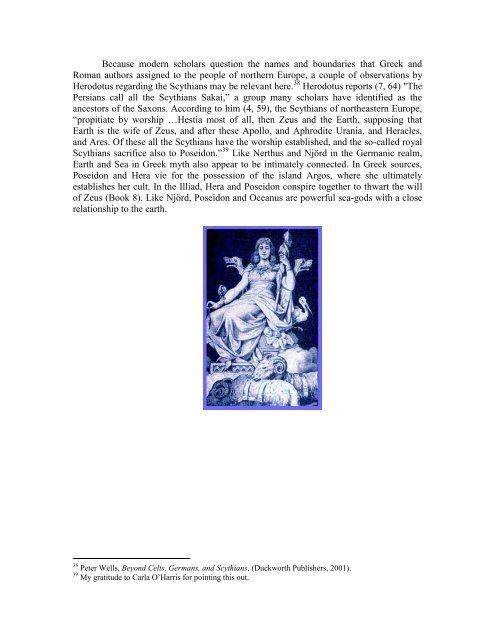You also want an ePaper? Increase the reach of your titles
YUMPU automatically turns print PDFs into web optimized ePapers that Google loves.
Because modern scholars question the names and boundaries that Greek and<br />
Roman authors assigned to the people of northern Europe, a couple of observations by<br />
Herodotus regarding the Scythians may be relevant here. 38 Herodotus reports (7, 64) "The<br />
Persians call all the Scythians Sakai,” a group many scholars have identified as the<br />
ancestors of the Saxons. According to him (4, 59), the Scythians of northeastern Europe,<br />
“propitiate by worship …Hestia most of all, then Zeus and the Earth, supposing that<br />
Earth is the wife of Zeus, and after these Apollo, and Aphrodite Urania, and Heracles,<br />
and Ares. Of these all the Scythians have the worship established, and the so-called royal<br />
Scythians sacrifice also to Poseidon.” 39 Like Nerthus and Njörd in the <strong>Germanic</strong> realm,<br />
Earth and Sea in Greek myth also appear to be intimately connected. In Greek sources,<br />
Poseidon and Hera vie for the possession of the island Argos, where she ultimately<br />
establishes her cult. In the Illiad, Hera and Poseidon conspire together to thwart the will<br />
of Zeus (Book 8). Like Njörd, Poseidon and Oceanus are powerful sea-gods with a close<br />
relationship to the earth.<br />
38 Peter Wells, Beyond Celts, Germans, and Scythians, (Duckworth Publishers, 2001).<br />
39 My gratitude to Carla O‟Harris for pointing this out.
















